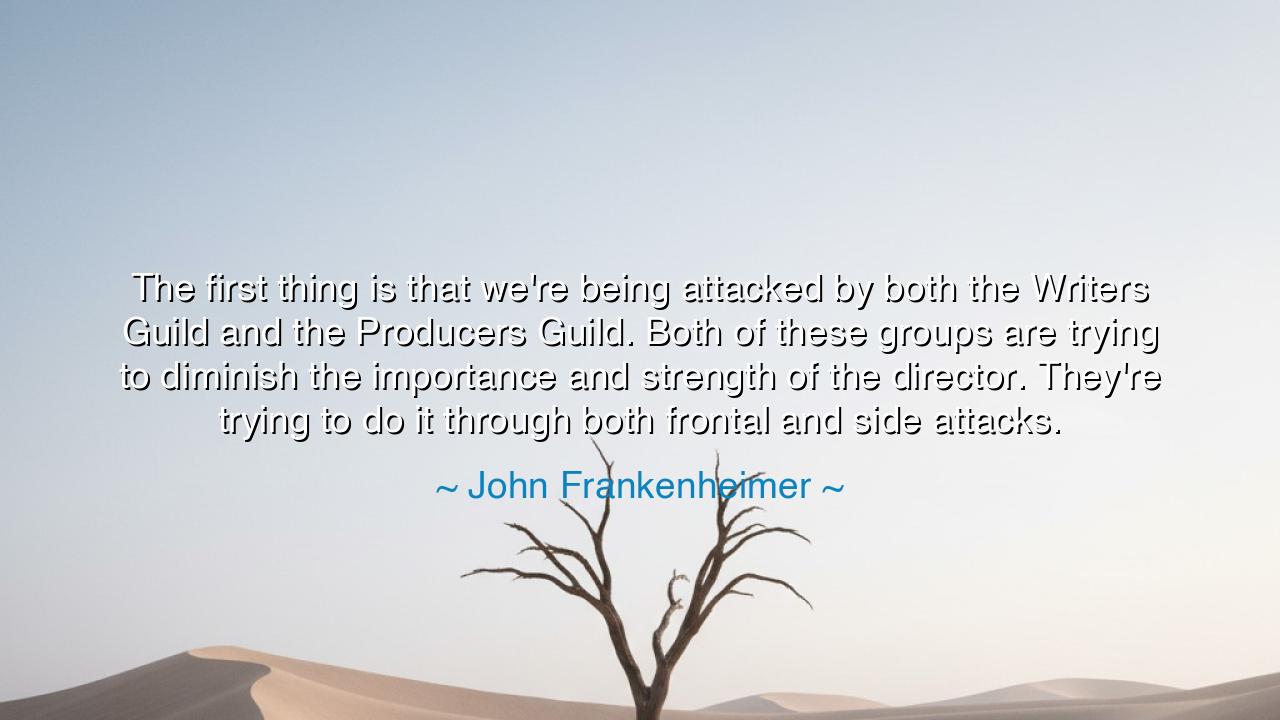
The first thing is that we're being attacked by both the Writers
The first thing is that we're being attacked by both the Writers Guild and the Producers Guild. Both of these groups are trying to diminish the importance and strength of the director. They're trying to do it through both frontal and side attacks.






Hearken, children of reflection, to the words of John Frankenheimer, a master of the cinematic craft, who proclaimed with vigilance and insight: "The first thing is that we're being attacked by both the Writers Guild and the Producers Guild. Both of these groups are trying to diminish the importance and strength of the director. They're trying to do it through both frontal and side attacks." In these words lies a meditation upon the struggle for creative authority, the preservation of vision, and the endurance of leadership in the face of opposition. Frankenheimer teaches that the true architect of art must defend the integrity of creation against forces that seek to dilute or redirect it.
The first revelation is the recognition of assault upon authority. In any endeavor where multiple powers converge—be they guilds, institutions, or competing influences—those who hold responsibility for vision must guard it carefully. The director, like the general of old armies, coordinates, guides, and shapes all elements of a production. To diminish the strength of this role is to weaken the unity and coherence of the work itself. Frankenheimer’s observation is a call to vigilance and discernment: one must perceive both frontal and subtle, side attacks, for both threaten the integrity of leadership.
History offers reflection of this truth. Consider Leonardo da Vinci, who faced critics, patrons, and political pressures as he pursued his works. His vision for the Last Supper or the Mona Lisa required steadfast focus and negotiation with forces that might have diluted or diverted his genius. Leonardo’s mastery lay not only in skill, but in his capacity to preserve the integrity of his vision amid competing claims and pressures—a timeless lesson echoed in Frankenheimer’s words.
The struggle Frankenheimer describes is not merely personal, but structural and systemic. Guilds, organizations, and hierarchies each seek influence, and their power may clash with the singular vision of the artist. The director, as the unifying force, must navigate these currents while holding firm to the essence of creation. Like the captains of old who steered ships through stormy seas, the director must assert authority with courage, clarity, and persistence.
Moreover, Frankenheimer’s words underscore the dual nature of opposition: direct and indirect. Frontal assaults are obvious, like a charge upon the gates; side attacks are subtle, like erosion at the foundations. Both threaten to compromise the vision if met with inattention. In life and art alike, those who seek to preserve integrity must cultivate awareness, strategy, and resolve. Awareness alone is insufficient; strength must be exercised in defense of the principles and mission that guide the endeavor.
Even beyond cinema, this truth resonates in leadership, scholarship, and craft. Consider Marie Curie, whose discoveries were met with skepticism, obstruction, and social bias. Her persistence in research, insistence on rigorous methods, and unwavering commitment to truth preserved the integrity of her work despite forces attempting to diminish her authority. Like Frankenheimer, Curie illustrates that the guardian of vision must be both vigilant and courageous, defending not personal pride, but the purity and impact of creation itself.
Practically, the lesson is to recognize that in any field, those who guide, direct, or create must protect the integrity of their vision. Anticipate opposition, whether overt or subtle, and maintain clarity of purpose. Develop alliances without surrendering authority, and confront challenges with both courage and strategy. The art of leadership is inseparable from the stewardship of vision and principles.
Thus, let this teaching echo through the generations: the creator, the director, the leader must defend the importance and strength of their role, for in it lies the coherence and vitality of the work itself. Beware attacks from all quarters, discern their form, and act decisively. Integrity of vision is not merely personal—it is the axis upon which the success, beauty, and meaning of the endeavor turn. In steadfastness lies both preservation and triumph.






AAdministratorAdministrator
Welcome, honored guests. Please leave a comment, we will respond soon